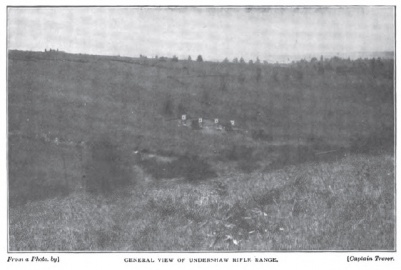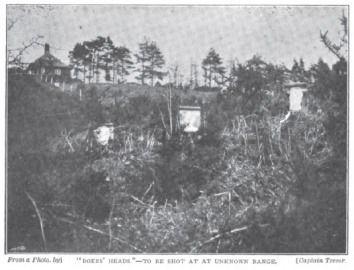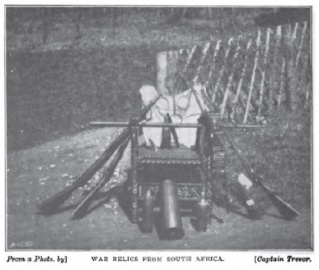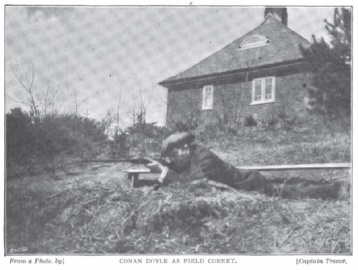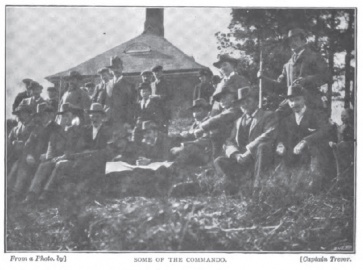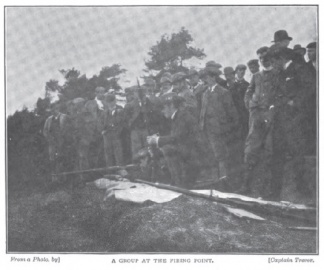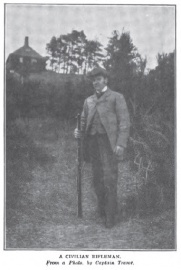A British Commando

A British Commando is an interview of Arthur Conan Doyle conducted by Captain Philip Trevor, published for the first time in The Strand Magazine in june 1901.
Conan Doyle explains how he created and organized "The Undershaw Rifle Club" near his home.
Editions
- in The Strand Magazine (june 1901 [UK]) 8 photos
- in Strange Studies of Life (january 1963, Sir Arthur Conan Doyle Society [US])
Photos
-
The Strand Magazine (june 1901)
-
General view of Undershaw rifle range.
-
"Boers' Heads" - to be shot at unknown range.
-
War relics from South Africa.
-
Conan Doyle as field cornet.
-
Lying in ambush.
-
Some of the commando.
-
A group at the firing point.
-
A civilian rifleman.
A British Commando
We had spent the morning together, planting heads among the heather. It may seem a curious occupation, sowing heads like turnips along a bleak Surrey hillside, but these heads were to represent the invader ; and from the firing points which one could see cut out on the other side of the valley the Undershaw Commando of civilian riflemen were to spend the afternoon in testing their skill.
"You see," said Conan Doyle, "we want above all things to run this upon practical lines, The distances of these heads are unknown. There can be no sighting shot any more than you would have a sighting shot at a skirmisher coming up the valley."
"Have your men had any practice in judging distance?" I asked.
"Yes. Our last prize was offered for that. We marked points on the hillsides, and the competition consisted in who should guess the distance most correctly. The judging was on the whole very good."
"In that case," said I, "these heads should soon be riddled?"
"I don't know," said Conan Doyle. "It's a windy day, and the bullet is a light one. Still, the men shoot very well."
"Have they had much practice?"
"We have been firing now twice a week for nearly six months, and we sometimes use close on a thousand rounds of ammunition in a single afternoon. You may guess, therefore, that the men shoot pretty well. If any critic doubts it, let him come and put his hand over the mantlet."
By this time the heads had all been satisfactorily hammered in, and were peering at us from among the bushes. Conan Doyle and I turned back to the house.
"If you want some information," said he, "come into my study and light your pipe. You can ask any questions you like, and I shall be only too happy to answer them."
We strolled through the hall, and I saw at a glance that his recent visit to South Africa had added to his stock of curios. His Arctic trophies, collected on a whaling expedition, were familiar to me, as were a variety of queer articles which he had picked up in Egypt and the Soudan. He noticed that my eyes were fixed upon his new property, and that my fingers were dallying with the button of my snap-shot camera. A less acute man than the author of "Sherlock Holmes" would have discerned my wishes.
"All right," he said, good-naturedly; "fire away at them if you like."
I took him at his word, and made a collection of articles of sorts, which I hung round and about his Viking chair. There were rifles of all descriptions, shapes, and sizes, in various states of repair. A few of these I got into the picture. Then some anklets attracted my attention.
"These," said Conan Doyle, "I took out of the prison at Waterval after we occupied the place. They have gripped the legs of English soldiers."
A half-knitted sock next furnished me with material for a question.
"Yes," said Conan Doyle; "that is also a Waterval prison relic. Look at the knitting-needles. 'Thomas Atkins,' you will see, has broken bits off the barbed wire of his cage to make them."
I said something trite about necessity and the mother of invention, and wondered how long this particular Thomas had thrust his bare feet into ammunition boots before he had taken to this sort of thing. I wondered, too, where he had got the worsted, for it was of the orthodox Government stamp. But most of all I wondered at the particular turn which the prisoner's ingenuity had taken.
"We treated the Boer prisoners rather better than this, didn't we?" I asked. "You, for instance, have done something to prevent them from being dull?"
"Oh, well, I sent them some copies of my 'History of the South African War,' if that is what you mean. Half-a-dozen to Ceylon and half-a-dozen to St. Helena."
"How did they like it?"
"I can't say," said Conan Doyle, "but they acknowledged my little present."
And he was good enough to show me the letter that one of them had written. It ran:—
- "To the Camp Commandant.
- "I am authorized by the officers of Hut No. 4 to convey to you and to the author, Conan Doyle, Esq., our heartfelt thanks for the work, 'Great Boer War' which is a very interesting addition to our library.
- "We are, dear Sir,
- "Respectfully yours,
- "G. C. Amenur,
- "Librarian."
"I sent it to them," said Conan Doyle, "because I felt that I had tried to state their case fairly, and I therefore hoped that they might take a fair view of our own."
I picked up some shells and a bayonet or two and added them to the little heap on the Viking's chair. I had just pressed the button of the camera when the gong sounded for lunch. And at lunch there was more rifle-dub talk. Mr. Strachey, the editor of the Spectator, had, through the medium of a motor-car, made nothing of the twenty miles which separated his home from Undershaw, and had come over to take part in the afternoon's meeting. He has started a club of his own, the mother of many, and he gave us much interesting information on the subject. Certainly it is by the comparing of notes that good accrues to all experimental movements. I may here mention incidentally that Mr. Strachey's coachman won one of the prizes at the meeting in the afternoon, and his success was heartily applauded by the Undershaw riflemen.
After lunch I resumed my conversation with Conan Doyle, and I must confess that when we were once more face to face in the little study I found myself somewhat embarrassed as to where to begin on a subject which really strikes at the whole of our Army organization, and at the possibility of introducing an entirety new and powerful factor in the defence of the country. I thought that it was perhaps better in the first instance to confine it to the local example before proceeding to the general principle.
"Now," said I, " about your own commando? I suppose that is really the correct term?"
"Well — we call it a rifle club," said Conan Doyle, "but it is really an attempt to engraft the commando system on to British soil."
"Do you contend that you introduced this system?"
"Oh, no - by no means. There were plenty of civilian rifle clubs in the country before. I have only endeavoured to extend and popularize the movement. Why, it was Lord Salisbury himself, in his famous speech, who first exhorted the people to form rifle clubs, though, of course, many existed at the time he spoke."
"How many riflemen have you?" I asked.
"We have a hundred and thirty. With the aid of the two other clubs which Mr. Whitaker and Mr. Bryan Hook have started in the neighbourhood upon the same lines as mine Hindhead could furnish over three hundred fighting men, which is not had for a sparsely inhabited country-side."
"And you have also some very young recruits who are coming on?"
"Quite so. I had forgotten the boys at Mr. Turle's preparatory school for the moment."
We both laughed, for we had each good reason to know Hindhead School, seeing that our own children are comrades there. There is an excellent short range in the grounds, and the little boys have already learnt to make good shooting with a miniature rifle.
I may add, too, that the introduction of rifle practice in no way destroys the keenness of the boys for athletics. Certainly, this is a move in the right direction; for, as some of us think, it is as necessary for a boy to learn to handle a rifle as to learn to swim.
"And from what class," I continued, "are these men drawn?"
"From all classes. We have a professor of Oxford side by side with a cabman or a mason in his corduroys. At our Boxing Day competition a publican and a nonconformist clergyman were shooting off their finals at the last range. The publican won."
"And are all on an equality?"
"Absolutely so. We run it on the most democratic lines. All riflemen are equal."
I must confess that his last remark somewhat shocked my military instincts. In the course of eighteen years I have managed, I hope, to shed most of the restrictive notions which it used to be the fashion to instil into the young officer on joining. But the idea of absolute equality in a fighting movement rather staggered me.
"How then," I asked, " would you work it as a military unit in time of war?"
"It would no longer exist as a military unit," said Conan Doyle, "It is a training school for higher things, The spirit of the men, if invasion were threatened, would carry them at once into the ranks of the Regulars, the Militia, and the Volunteers, which, instead of raw recruits, would be gaining trained riflemen."
"Do you think they would all volunteer?"
"I think the greater number of them would. The residue would act as local guides, scouts, and irregulars."
"Then in that way," said I, "you get over all criticism as to transport, commissariat, and discipline?"
"Exactly : they would find all that in the corps which they joined. The lesson of the South African War is, speaking roughly, that the best soldier is the best shot. In this sense, therefore, the clubs would be a great nursery for good soldiers."
"Do you find the men keen?"
"Extraordinarily keen. In rain and hail and wind they have never once failed to turn up on a shooting day, I have seen them firing when the targets were only occasionally visible through the break in the mist."
"Do you ever think of having field manoeuvres?"
"We are to have something of the sort in the future."
"In that case how will you get on without a leader?"
"Each commando would have its own equivalent to a Field Cornet, exactly as the Boers have, and the men would obey his orders."
"I suppose then that you are Field Cornet of your own riflemen?"
"Yes, I am."
"With no officers under you?"
"No. I think it better that all should be equal."
"An invading force, I should add," said Conan Doyle, "has offered to come up at Whitsuntide to test us. We are, however, crippled by want of weapons. You see, we have to do everything for ourselves ; and, though the men willingly pay for their own cartridges, three hundred rifles is a large order. We hope sooner or later the Government may see their way to handing us over their discarded rifles. We shall be very glad of even an obsolete weapon. An old Martini-Henry in the hands of a trained shot is better than a Lee-Enfield in the hands of a duffer."
"But could you practise with Service rifles? I understand that at present you confine yourselves to the small Morris tube cartridges?"
"We have to do so, unfortunately. The modern bullets ricochet — as you yourself well know — is so incalculable that we dare not fire it on these private ranges. The chances of an accident, however, would be very small, and I think myself that we are inclined to rate human life too high where national interests are at stake. Still, we cannot move in advance of public opinion. What I hope is that, when the whole district is full of these little rifle clubs, we may then get a central range to which they could all adjourn. Bisley is very useful to men of means, but to the ordinary civilian rifleman it might as well be in the moon. We must have local ranges if the men are really to get the good of them."
"But you find meanwhile that the short-range system is useful?"
"I think any man who is a really good shot at 200 yds. will be a pretty fair shot at any range."
"How many men do you suppose that this movement might furnish to the country?"
"It is impossible to estimate. At present the clubs are springing up everywhere. Some hundreds of clubs are in existence, and they will grow to thousands. I see no reason why a good proportion of the able-bodied population should not be enrolled in the rifle clubs. That would mean little clubs all over the country."
"Who would go to the trouble and expense of founding them?"
"That is the duty of the country gentlemen. They are the natural leaders of the people. In every district it is they who should be organizing clubs and laying out ranges in their parks and grounds. I have every possible sympathy with sport, but this patriotic movement is more important than shooting birds and chasing foxes, though, as you know, I occasionally do both myself. And it is very good sport as well."
"Is it an expensive matter starting such a range as yours?"
"Not necessarily. The first thing is to give the land. Mrs. Tyndall has kindly co-operated with me in this. The next thing is to get the targets and mantlets to protect the markers. This should not cost more than £15, and can be done by the village carpenter. Then with three rifles, which will cost about £5 each, you will be able to make a start. Thirty or forty pounds should cover the preliminary expenses."
"Are the riflemen willing to pay for their own ammunition?"
"Most willing. And they are very keen on making the whole thing as practical as possible. However, you shall judge all that for yourself this afternoon."
"Do you suppose that the Government will eventually arm them?" I asked.
"Certainly I think so. Considering that these men ask for no uniform or capitation grant, and are no expense in any way, Government cannot do less than give them rifles - cast ones from the Army perhaps — and ammunition with which to practise.
"There is one other thing I should like to say," said Conan Doyle, as we rose and left the study, "and that is that I consider it very important to keep these rifle clubs apart from any political association. They have nothing to do with politics, and the connection of the two is invidious and dangerous."
"One more point," I said. "How do you consider your rifle clubs will affect the Volunteer movement?"
"I think the clubs will fill a place of their own. In the small country districts there is no scope for Volunteer companies, and also there are many men who would gladly practise with the rifle near their homes who would not care to commit themselves to the various duties which a Volunteer who is in earnest should perform."
Then the clock struck two, and we hurried to the range which adjoins the house. The shooting commenced punctually, and for some hours we all had a busy time.
As a Regular soldier, and as one who had always taken a great interest in musketry, I was naturally very anxious to win, if possible, the "heads in the heather" prize.
Some half-dozen of the civilian riflemen, however, gave me a very practical lesson both in judging distance and in holding the weapon straight ; and Rifleman Reader, who won the competition, certainly shot admirably. A gale of wind was blowing obliquely across our left front, and it was no easy matter, under the circumstances, to get more than two-thirds of the shots fired on to a head which was partially concealed by the bracken at an unknown range. We seemed to be firing at midgets.
Perhaps I might here explain, without going into technical detail, that a Morris tube is an arrangement which fits into the barrel of a Service rifle and thus enables miniature ammunition to be fired. The ordinary Lee-Metford bullet carries about two miles, and the rifle ranges, therefore, upon which it can be used with safety are few and far between. The Morris tube ammunition carries only about a tenth of that distance, but will yield most accurate shooting with the long cartridge at a range of two hundred yards. If it does not do so it is the man and not the machine that is at fault.
Though I have seen and taken part in many rifle-meetings, this little Easter gathering of Undershaw riflemen came to me in many respects as a pleasant surprise. There was a delightful absence of grumbling at the firing-points, and there was a general readiness to act as markers, take messages to the mantlets, signal hits, and keep score-sheets. I went hither and thither with Conan Doyle, who took his turn at all duties, and nowhere was he called upon to settle any dispute. Riflemen were most ready — except, of course, in the "heads" competition, in which secrecy and silence were naturally enjoined — to give each other the benefit of their experiences, and one little incident in particular occurred which served to lay stress upon the spirit and temper of the men. An apparent hitch had occurred in the marking at a certain target at which two competitors were firing off the tie which was to decide the hundred yards prize. Each at once offered to start afresh. Those who have much experience of rifle-meetings will not, I think, disregard the value of this scrap of evidence. I was struck, too, by the absence of fuss or flurry, and also by the fact that, though all were bright, cheery, and interested in what they were doing, there was no disposition to look upon the thing as a game. These men are in earnest, and it is not with a craze for a new excitement that they have joined the Undershaw Rifle Club.
Recruits commence shooting at the fifty yards range, and I spent an interesting hour in watching those who were at that firing-point. When they have attained a certain competency at fifty yards they are moved back to seventy-five yards, where they must again qualify ere they go back to a hundred yards. At a hundred yards if they make a certain score - and that score takes no little making — they are awarded a rifleman's hat. At present about a third of the club have succeeded in winning the hat.
I resist the rather obvious temptation to describe in detail various instructive incidents which came from time to time to my notice during the course of the afternoon. It was abundantly clear that one and all, quite apart from the possibility of securing a prize, were bent on improving their shooting. One rifleman in particular, an erudite classical scholar, was much disgusted at his lack of success, and did not fail to aver in unmistakable terms how much he had fallen in his own estimation in consequence. I drew Conan Doyle's attention to this litany. "Quite right," he said; "I hope the day is fast coming when the man who cannot shoot will be ashamed of himself." At the same time no one is more helpful to the Undershaw rifleman who is in difficulties with his weapon than the founder of the club. But he believes, nevertheless, in them working out their own salvation.
The competitions were over all too soon, and then with a speech that was very short and very much to the point Conan Doyle presented the prizes. The "heads in the heather" prize, given by Mrs. Conan Doyle, was won as has been mentioned, by Rifleman Reader, a member of the club who is as much interested in other men's shooting as he is in his own. Another prize won by Rifleman Booth produced a very instructive competition and was carried off by the man in question by a single point after the shooting off of a tie. The experiences of the two men who were in at the death differed much. The winner was a trained shot of many years' standing, and the second on the list, Rifleman Holden, is coachman at Undershaw, and fired a rifle for the first time a few months ago. He invariably makes a good score, and his success, therefore, is most encouraging to recruits.
Even after the prizes had been distributed and the meeting proper was over many enthusiasts stayed behind for a little further practice at the targets, and it was after sundown ere the last man left. So ended a profitable and instructive day.
The Regular soldier dealing with a matter of this sort would be either more or less than human if he refrained from the expression of personal opinion on the subject. During the afternoon Conan Doyle and I had discussed the attitude of the professional soldier with regard to the movement. The professional writing soldier — if I may employ such a term without offence — has been somewhat up in arms in the reviews against what he would appear to think was an encroachment upon his own preserves. But if you beard the professional soldier in the privacy of his smoking-room you would soon discover that he both recognises the necessity of this movement and is in sympathy with it. Astounding as the statement may seem, he is provided as a rule with his due share of common sense. Just at the moment, perhaps, anything which has the word "civilian" prefixed to it has rather a tendency to irritate the "Regular," or at any rate such Regulars as have no taste for analysis. They have seen the civilian given a sergeant — major's pay five minutes after first introduction to a rifle, a horse, and a suit of khaki ; and they think that they have descried a tendency in the Press to relegate them to the obscure corner of an inside sheet, and to write large on the front page the doings of the citizen soldier. They fail to see that what has happened is merely due to the inexorable decree of the law of demand and supply. So, if in certain quarters the Regular soldier would seem to be a little restive in this matter, such apparent fractiousness is not to be taken too seriously. Generally speaking, too, he misunderstands the import of the scheme and its limitations. No one outside a lunatic asylum proposes to substitute the civilian rifleman for the trained Regular soldier. As Conan Doyle rightly says: "We only propose to supplement existing arrangements."
Moreover, it is surely the duty of every householder to take reasonable care of his own back yard, or his own front garden for a matter of that. If a fire breaks out in a house or a burglar breaks into a house, by all means summon the fire brigade or the police at the first available opportunity. But the fact of doing so does not preclude us from turning our attention to the cistern or the poker pending the arrival of the professional element. And if we have had experience in the methods necessary for fighting the foe, so much the better for us. That is the whole principle of the civilian rifle club. Self-defence is an obligation on the individual, and is not to be relegated to a cult.
Conan Doyle, it will be remembered, expressed the view that in the event of invasion, actual or apprehended, the majority of the riflemen would enter the ranks of the Regulars, Militia, or Volunteers, and that the residue would act as local scouts, guides, and irregulars. And what a valuable residue that will be! For there is negative as well as positive value. The general of the future will hesitate, be his army never so numerous, ere he attempts to overrun a country whose civilian inhabitants (apart from the military forces who assist them) are prepared to defend it field by field. And he will hesitate the more when he reflects that those inhabitants, besides being minutely acquainted with the geography of their own homes, are expert in the use of the rifle.
Without question the rifle club movement has come to stop, and though it will doubtless alter, and in fact develop, in scope and in detail, it is upon the lines on which such an association as the Undershaw Rifle Club is conducted that all similar movements must work.
The chief necessity is, it would seem, to secure a strong field cornet for each commando. It would be idle to pretend that the Undershaw Corps does not owe the large majority of its gradually increasing success to the energy, ability, and capacity for administration of Conan Doyle. I fancy that a leader of men, like a poet, is born and not made, though the doctrine at first blush would appear to be somewhat discouraging. But such men exist in fairly good numbers, and, fortunately, one has not to hunt for them, as they have a tendency to come to the front of themselves.
One word further on the official aspect of the case. Conan Doyle ventures to think that in the future the Government will arm the rifle clubs and assist in the matter of the supply of ammunition. My professional work has laid much with the supply of arms in the past, and is now concerned with the supply of ammunition. I am convinced that to do as Conan Doyle suggests would be, relatively speaking, a mere drop in the ocean. One can hardly think that a Government composed of business men would hesitate to pay so small a premium for so very profitable an insurance. But it is, of course, first of all for the inhabitants of this country to supply the necessary moral pressure by showing that they are in earnest. And, above all, it is imperative that men of acknowledged strength, character, and importance in other parts of the land should do as Conan Doyle has done. There is one adage which is never stale: "Si vis pacem, para bellum."

